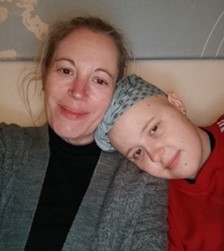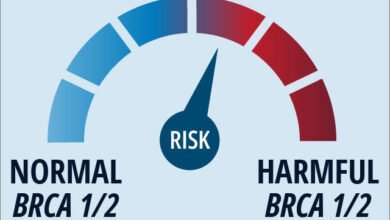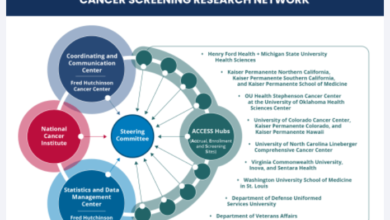Cancer Research UK – Science blog

This April, we’ve been exploring cancer in teenagers and young adults. This age group faces distinct challenges, but it doesn’t always get the attention it deserves. With Teenage and Young Adult Cancer Awareness Month, we’re working to change that.
Last year, a study we helped fund found that young people who have to wait longer to be diagnosed with cancer are more likely to be clinically anxious, depressed and report lower quality of life following their diagnosis.
Nearly half of the 830 teenagers and young adults in the study waited longer than 2 months from noticing a possible symptom to attending their first oncology appointment. That can be long time. Especially when you’re wondering if it could be cancer.
This group was almost twice as likely to report poorer quality of life, clinical anxiety and depression.
We know that if a cancer is found earlier, it is more likely to be easier to treat. But, with the NHS still recovering from the pandemic, waiting times are significantly longer than we’d like. This study looked at 13 to 24-year-olds diagnosed with cancer between 2012 and 2014, and, even then, nearly 60% waited 3 months or more from noticing their first symptom to starting treatment.
For the first time, it’s now clear that these delays aren’t just impacting young people’s physical health, but they’re having severe consequences on their mental health too.
The road to diagnosis
Dealing with cancer isn’t taught at school. It’s devastating at any time, but it can be especially isolating for young people. Awareness is part of that issue.
Teens and young adults already have plenty on their minds as it is, and their bodies are going through lots of changes, too. So, when something feels different, would your mind jump to cancer? At that age, probably not.
“The pathway to cancer diagnosis for teenagers and young adults is complex,” says Dr Lorna Fern, the study’s lead researcher.
“Not all young people know the signs and symptoms, which can mean help isn’t sought straight away. For health professionals, cancer in teenagers and young adults can be difficult to diagnose as some cancer types are rare and symptoms can be vague.”
It’s easy for symptoms like aches and pains to be attributed to stress or puberty. That means early signs of cancer can be misidentified or ignored, making it harder to treat when it’s finally diagnosed.
The moment before contact
And, as this new study shows, the uncertainty takes its toll as well.
At the height of the COVID-19 pandemic, there was a 17% drop in childhood, teenage and young adult cancer in England. While a drop sounds good, clinicians fear this might have been caused by the fact young people were more hesitant to contact their doctor after noticing symptoms.
There could be all sorts of reasons why you may not want to contact your doctor. But for young people, a big reason is often the stress and strain of having to explain themselves through multiple appointments.
“We hear so often from young people that despite repeated trips to their GP with health concerns, that they have not felt listened to or taken seriously, and how stressful this can be,” says Amy Harding, Deputy Director of Services at Teenage Cancer Trust, who part-funded the study.
While their peers may be worried about exams, starting work, or wondering where to go next year, these teenagers and young adults have completely different, and much heavier, questions weighing on their minds. It’s especially difficult when they don’t feel like their doctors can help answer them.
The study also found that patients who had three or more GP consultations before they were referred to a cancer specialist were more likely to report poorer quality of life and clinical anxiety.
All that’s before treatment even starts. “Without the right psychological support, the experience can damage a young person’s mental health for life,” continues Harding.
But these aren’t reasons to put off going to the GP. Teenage and Young Adult Cancer Awareness Month is a way of shining a spotlight on cancers in this age group so we can start to improve how they’re diagnosed.
“The first step in the process of getting help for a possible cancer symptom can feel like a difficult step to take – but most of the time it’s not cancer and, if it is, getting diagnosed at an early stage could make a big difference,” says Dr Julie Sharp, our head of health information.
“The message from government during the COVID-19 pandemic was to stay at home, but now, if people notice something not normal for them, they shouldn’t delay speaking to their doctor. They want to hear from you, especially if things are getting worse, so keep trying if you can’t get an appointment right away.”
Ellie’s Story
In 2021, at 18 years old, Ellie was diagnosed with Ewing sarcoma. She had pain in her kidney for months, but the initial blood tests came back clear, so no further action was taken.

Ellie (right) and her mum, Sam (left).
In June 2021, just after completing her A-levels, Ellie went away with her friends. She felt sick for the whole week. When Ellie arrived back, she was diagnosed with a major kidney infection. After further tests, doctors found a 13cm tumour in her kidney.
Ellie had an incredibly rare type of bone cancer that didn’t start in her bones.
“As well as kidney pain and sickness, I also had a lot of weight loss. It was put down to exam stress or mental health issues,” says Ellie. “I had never been someone who had been to the doctor a lot, but that did seem like a logical explanation at the time, so we hoped it would improve. But then it just got a lot worse. That’s when I was diagnosed.
“The problem in this age group is that symptoms can get brushed over a lot. They can be put down to other things, which I understand, but it is something that can improve.”
What can be done?
There’s a lot we can do to help take care of teenagers and young adults going through cancer. We’re focusing our research into projects like the DETERMINE trial to make sure young people get the specialist attention and treatments they need. But to move forward we also have to focus mental health.
“No young person should have to face the trauma of cancer alone,” says Harding.
“It is therefore absolutely vital that they are able to refer young people to specially trained psychologists within the NHS.”
Cancer awareness months are a way of pushing back against that loneliness and isolation. This April, we’ve been working closely with other charities, like Teenage Cancer Trust, to highlight the changes we urgently need to help teenagers and young people with cancer.
There’s plenty to build on. Teenage Cancer Trust has 28 special units in NHS hospitals, each with a dedicated team of specialist nurses and support workers. These units are designed to let young people be themselves, giving them the comforts of home during treatment, as well as the chance to spend time with other people their age.
But to improve mental health we also need to improve the path to diagnosis. Ellie’s story shows how difficult it can be for young people to find out what’s happening to them, and how scary it can feel when you don’t have the answers.
“We don’t yet have the evidence on how to shorten diagnostic times for young people, but we can identify those who may be impacted by their diagnostic journey and provide extra support, such as the holistic care provided by Teenage Cancer Trust’s units and frontline staff,” says Fern. “With further research, we hope in the future to know how to expedite cancer diagnosis for teenagers and young adults.”
We’re doing much more than hoping, though. We’ve united with more than 60 cancer charities, as One Cancer Voice to petition the Prime Minister for fully funded, ambitious, long-term action on cancer in England. We also are developing a Manifesto for Cancer Research and Care – a transformational approach to improving cancer research and care in the UK.
This is the first Teenage and Young Adult Cancer Awareness Month. With each one, we’ll have more to offer.
To learn more about teenage and young adult cancer symptoms and support, you can visit our About Cancer pages.
Source link
#Cancer #Research #Science #blog



